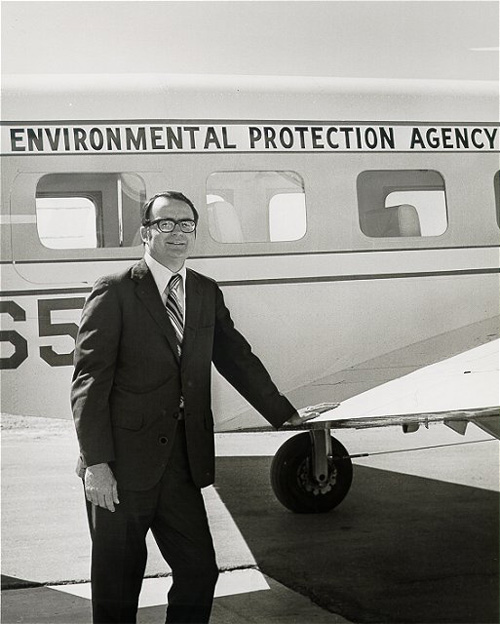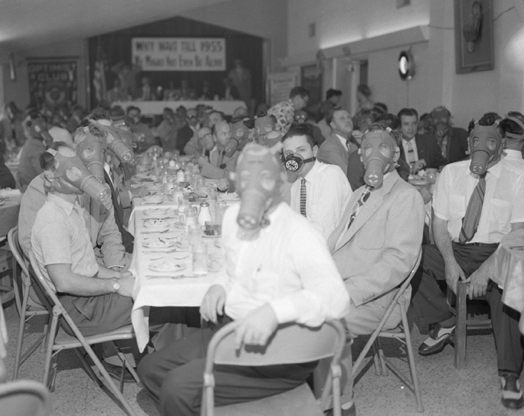
Note: William Ruckelshaus died on November 27, 2019. His presence is greatly missed. His example of service is timeless and can be of use to many people—including those who did not have the privilege of knowing him in life.
The founding administrator of the US Environmental Protection Agency, William Ruckelshaus, has died.
Clare Boothe Luce famously said that even the most prominent public figures are accorded a single sentence in history. Bill Ruckelshaus’s one sentence will surely be that he was a hero of the Watergate scandal. Then deputy attorney general to Elliot Richardson, he joined his boss in resigning rather than executing President Nixon’s order to fire special prosecutor Archibald Cox.

EPA Founder
As important as Ruckelshaus’s Watergate role was, his service as the founding administrator of USEPA was at least as significant.
Ralph Waldo Emerson declared that institutions are “the lengthened shadow of one man.” To a great extent that is true of Ruckelshaus’s impact on USEPA—and thereby on a binding thread of the fabric of American life.
Ruckelshaus was a skilled practicing politician. He not only served in the Indiana legislature but came within a whisker of winning a tough 1968 US Senate campaign against another exceptionally talented candidate, Birch Bayh. That experience was invaluable in creating a new agency, dealing with a range of energized stakeholders with a multitude of perspectives and goals and commitments.
It’s clear with the passage of time that the Nixon administration was exceeded only by Theodore Roosevelt’s as the most consequential for environment stewardship in the twentieth century.
Unlike Gifford Pinchot, Roosevelt’s high lieutenant for conservation, Ruckelshaus served a president who exhibited little personal dedication much less sentimental attachment to the project. Nixon artfully responded to rapidly changing public sentiment on energy and environmental matters. As with other domestic issues, he would delegate operational latitude to trusted staff. This enabled the president to turn his direct attention to his top priority: foreign affairs and defense policy.
Nixon’s capacity to attract talent made this approach work in the environmental arena. Ruckelshaus worked in harness with a number of key White House staff, including John Ehrlichman, Russell Train, and rising star William Reilly.
The Republican Nixon administration faced a Congress dominated by the opposition Democrats. Each of the major parties was riven by internal divisions: industry, environmentalists, labor unions, regions, state and local government and more. Compared to the early twenty-first century, partisanship was defining for purposes of campaigning and organizing Congress, but there was much greater diversity of policy opinion within each party.
All this at a moment when the nation was cleaved by the Vietnam conflict.
Ruckelshaus adroitly navigated these rapids. He did so while undertaking the complex managerial task of assembling an agency from existing departments, many of which were resistant or passive-aggressive in the protean, shape-shifting, time-honored way bureaucracies can be.
Amid these multifarious challenges, Ruckelshaus imparted and imposed his vision of the agency. Public trust must be earned. Enforcement must be without fear or favor. Science must be the foundation for decision-making. Externalities must be internalized. Markets should be allies where possible. Transparent processes open to the range of stakeholders are necessary for enduring progress.
Leader
A decade later, when President Reagan sought to quell the political firestorm that enveloped his first EPA administrator, Anne Gorsuch Burford, he turned to Ruckelshaus. The unique combination of the Hoosier’s respected record in establishing the agency and his aura of integrity from the “Saturday Night Massacre” of 1973 doubtless rendered his selection all but inevitable. This was more than enough to outweigh his mixed thoughts about the changing direction of the Republican Party.
It was during his second tour at the agency that I had the privilege of serving on his staff. Ruckelshaus’s performance was a master class in leadership.
EPA was in disarray. The bureaucracy had become defensively dysfunctional in response to Burford. She was marked by an unsettling combination of high cognitive capacity yet limited relevant experience and insufficient imagination or humility to learn and adapt.
Ruckelshaus immediately moved to restore the trust of relevant stakeholders. Reversing his predecessor’s self-imposed isolation in the misleadingly named “penthouse” office suite of the rather shopworn Waterside Mall, he literally and figuratively threw the doors open.
When he was recruited for his second tour, Ruckelshaus sought and was granted unusual latitude in selection of high-level appointees. This demand reflected the street smarts accrued from prior service in the Nixon administration. Such authority is not a dispensation granted to many cabinet officers. It was particularly notable in the Reagan administration, which centralized appointments in a way unfamiliar at the time but followed by successors of both parties.
Ruckelshaus assembled a strong team. Philip Angell, a master communicator, served as his chief of staff. Al Alm, a Democrat who distinguished himself on the staff of the Council on Environmental Quality in the Nixon administration, became deputy administrator, chief operating officer. James Barnes, an Indiana native and talented lawyer, was general counsel. Will Erwin, a distinguished Hoosier in business and politics, returned as liaison to the ever-vigilant agriculture community. He also attended to relationships with key officials at other agencies. Hank Habicht was a notably supportive ally at what was then called the Lands Division at the Department of Justice.
Ruckelshaus righted the ship. He executed a turn-around in challenging circumstances. An election year loomed in 1984. Partisanship had become more pronounced in the aftermath of Watergate and the Vietnam tragedy. Interest groups were aligning accordingly. Environmental advocacy groups largely allied with the Democratic Party.
From the perspective of nearly forty years on, one recognizes the early stages of the hyper-partisanship and overall dysfunction that has since seized up Washington. Ruckelshaus’s “Mr. Clean” image was scrutinized without sentimentality amid the Senate confirmation process. During his second tour at the agency the administrator would dedicate considerable time responding to a plethora of congressional committees and subcommittees, often overlapping and more than occasionally overbearing.
Ruckelshaus maintained an imperturbable mien. Tall and fit, he could be a commanding presence. Like Franklin Roosevelt, he was notable for a leonine head that imparted strength of purpose. His prominent forehead and jawline were complemented by expressive blue eyes, set off by thick brows and lashes.
Quite often those eyes crinkled amid smiles and chuckles. His signature sense of humor could dispel any sense of intimidation that some might otherwise have experienced. “Ruck,” as many longtime friends referred to him, was adept at deploying quips to lighten tense settings or reset a context for persuasion.
Ruckelshaus took appropriate pride in his service at the agency. Taking stock of his varied public and private positions, he said that at EPA he found a unique mix of challenge, excitement, interest and fulfillment.
As a final service in his second tour of duty, he ensured that his successor would be a capable career official who shared his values of stewardship, Lee Thomas. He kept a hand in the agency in subsequent years, including advice in personnel selection and management.
Steward of Institutions
A golden thread through Ruckelshaus’s life and work is institutional stewardship. Throughout his career he exhibited commitment to institutions, ranging from the Catholic Church to the Republican Party, to American government and the military, to educational and corporate organizations. He held himself and others to high standards to meet institutional ideals.
One wonders if this may have been accentuated in his generational cohort. He came of age in the aftermath of the Second World War. He graduated from Ivy League institutions shortly before the turbulence of the 1960s, amid an unselfconscious commitment to national ideals and service. He served in the military during the last American peacetime draft. This may help explain the coincidence that Ruckelshaus’s law school classmates included other notable public servants: Michael Dukakis, Paul Sarbanes, Antonin Scalia, and Michael Traynor.
This tendency was interlaced with a sense of living history, connecting the present to the past and future. He was dedicated to his alma mater, Princeton University—and would be honored with the Woodrow Wilson award for public service. Later he was presented the Medal of Honor of the Theodore Roosevelt Association. If anyone could personify the merits of two rivalrous historical figures, both of whom he admired, it was Bill Ruckelshaus. President Obama would later select him for the nation’s highest civilian honor, the Medal of Freedom.
His family had a long history in Indiana politics, as did some of his friends and colleagues, including Richard Fairbanks and Albert Beveridge III.
Unsurprisingly, Ruckelshaus recoiled against those he sensed were putting larger institutions and causes at risk for their own purposes. He surely experienced significant disappointment at the decline of some historic enterprises, expressed in his ongoing evolution, for example, in supporting Democratic as well as Republican candidates.
Character is Destiny
Character is destiny. To those who were privileged to know him in various aspects, Bill Ruckelshaus’s character will remain exemplary. He provided a lodestar by which others could navigate their own journeys.
Such individuals are necessarily rare; today they seem to be altogether missing in American public life. As twenty-first-century Washington is riven by the bitter partisanship feared by our founders, one looks in vain for citizens who can transcend and reset the chaos and conflict. Ruckelshaus’s career and character remind us that such people can emerge—and suggests we should consider how to nurture young people for such service in the future.
Inevitably, he faced disappointments as well as triumphs. His first wife died tragically young. He came within a hair’s breadth of being selected as President Ford’s vice presidential running mate in the summer of 1976. His father died unexpectedly in a boating accident.
Through it all, Bill and his beloved wife Jill constituted an extraordinary couple, who acted with distinction and honor across a range of public and private pursuits that are rightly revered in all times.
